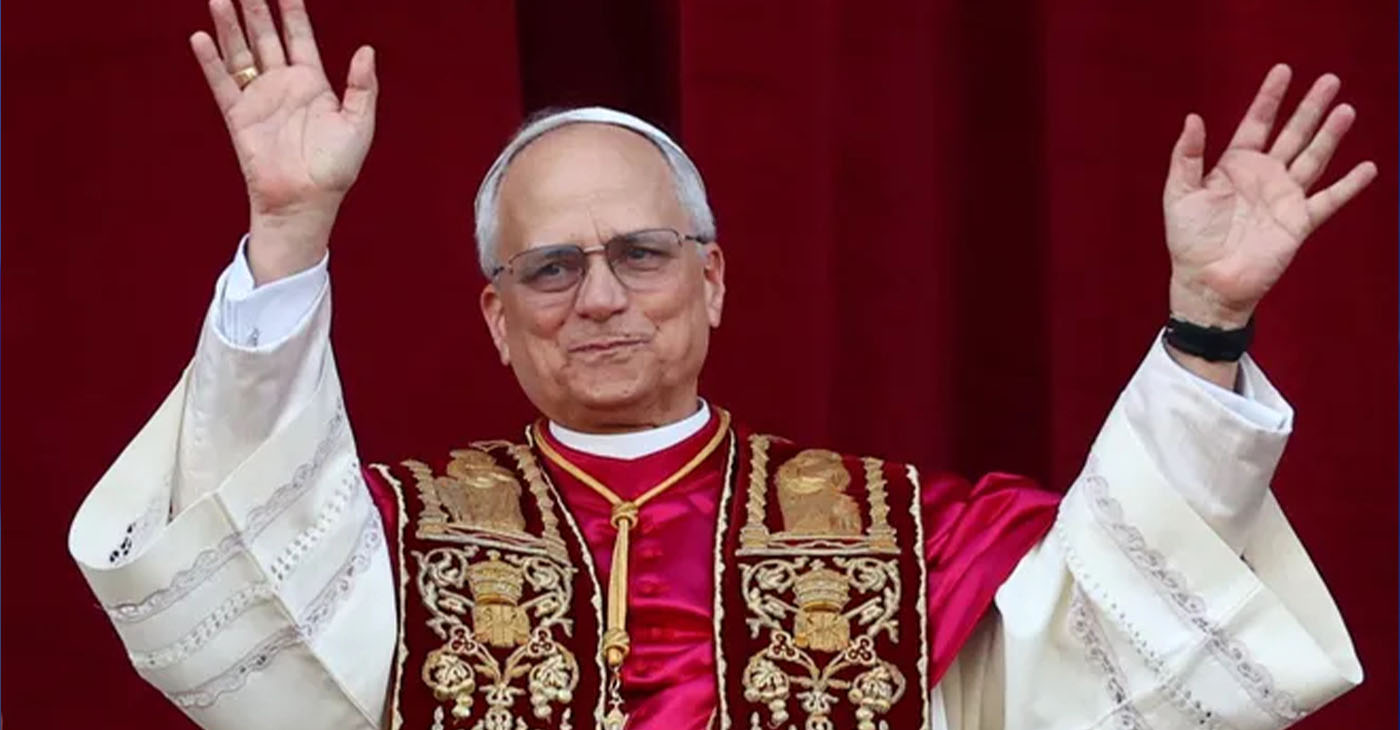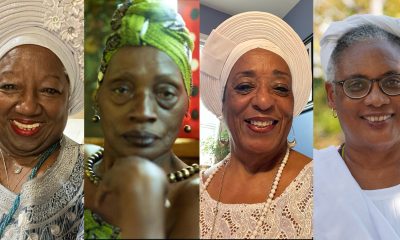World
Boko Haram Increases Attacks as Nigeria Elections Loom

Children stand near the scene of an explosion in a mobile phone market in Potiskum, Nigeria, Monday Jan. 12, 2015. Two female suicide bombers targeted the busy marketplace on Sunday. (AP Photo/Adamu Adamu)
MICHELLE FAUL, Associated Press
Boko Haram, Nigeria’s homegrown Islamic extremist group, is increasing the ferocity and tempo of its attacks, destabilizing Africa’s most populous nation as it prepares for elections.
Girls as young as 10 are being used as suicide bombers. There have been daring attacks on military barracks in Nigeria and Cameroon. The group, which wants to impose Shariah across the country and is increasing its territory under a self-proclaimed Islamic caliphate, recently massacred hundreds of civilians, with death toll estimates ranging up to 2,000.
President Goodluck Jonathan, the front-runner in the Feb. 14 presidential and legislative elections, launched his campaign last week with no reference to the seizure of a key military base at Baga, near the border of Cameroon and Chad. As soldiers fled the base on Jan. 3, Boko Haram went on a killing spree, reportedly drowning many in Lake Chad. Amnesty International called it the deadliest massacre in Boko Haram’s 5-year insurgency.
Survivors have described hundreds of fighters riding into town in a column led by an armored personnel carrier stolen from the military, on the backs of pickup trucks and on motorcycles, firing rocket-propelled grenades and assault rifles and hurling homemade bombs that set buildings ablaze.
A military officer said that more than 10 days later, Baga remains under the control of Boko Haram.
“We have not heard any order deploying soldiers to return to Baga for now,” he said. He spoke on condition of anonymity because he feared being punished by his superiors for talking to the press. “As a matter of fact, most of the soldiers that managed to escape from Baga had redeployed back to their mother stations of deployment.”
The marginalized part of the country is semi-arid desert that turns to lush forest around Lake Chad and is home to traders, subsistence farmers, herdsmen and fishermen. It includes a couple of the biggest cattle markets on the continent.
Since August, when the insurgents declared they were recreating an ancient Islamic caliphate that included parts of Cameroon, Chad and Niger, they have seized or consolidated control of more than 10 percent of Nigerian territory, mostly in the state of Borno where the group was created. In Borno, Boko Haram holds 14 of the 27 local government areas including all the border crossings into Niger, Chad and Cameroon.
This week, hundreds of Boko Haram fighters attacked a Cameroonian military camp near the border, but, according to Cameroonian officials, they bit off more than they could chew. Cameroon’s government said Tuesday that its military killed 143 militants with only one Cameroonian soldier killed.
Boko Haram also holds small parts of Nigeria’s Adamawa and Yobe states. While most attacks occur in the northeast, leaving many Nigerians remote and uncaring about the conflict, hundreds were killed last year in car bomb attacks in Abuja, Nigeria’s capital, and in Jos, both in central Nigeria.
Analysts say Boko Haram fighters numbered no more than 4,000 or 5,000 about 18 months ago when they began abducting hundreds of mainly young females and males. The group also has been recruiting fighters for pay in neighboring countries.
While there is little likelihood of Boko Haram overrunning Nigeria, many worry that the group’s hostility to democracy will increase attacks around the elections. Nigerian troops have been unable to snuff out the insurgency despite a pledge by top commander last year to do so in a three-month span.
Boko Haram attracted international attention when it seized some 276 schoolgirls from a boarding school in April last year. Dozens escaped on their own but the failure of Nigeria’s government and its once-powerful military to rescue 219 who remain missing has brought condemnation and puzzlement.
Nigeria’s military budget amounts to between $5 billion and $6 billion a year, yet soldiers are reportedly being sent into battle with just 30 bullets, former U.S. Ambassador John Campbell to Nigeria told The Associated Press. Several generals last year were found guilty by a court-martial of delivering arms and information to Boko Haram. Soldiers say they are demoralized because Boko Haram outnumbers and outguns them where they’re deployed in hostile territory without even food rations and because officers steal part of their salaries. Some of the troops who are supposed to be rotated every six months have been in the war zone for more than two years.
Campbell, now a member of the Council on Foreign Relations, said that Nigeria’s military, once considered the single national institution that would prevent the country from breaking apart, is riven by tribal and religious cleavages.
Nigerian officials insist that voting will be carried out in the northeast next month, but it will be a challenge if not impossible to conduct the polling in an area where some 1.6 million people have been driven from their homes and in places where even government soldiers don’t dare to tread.
___
AP writer Haruna Umar in Maiduguri, Nigeria contributed to this report.
Copyright 2015 The Associated Press. All rights reserved. This material may not be published, broadcast, rewritten or redistributed.
Activism
African Union Group to Award Rev. Dr. Amos Brown for Bringing Civil Rights Movement to Global Stage
Dr. Macaulay Kalu, secretary general of AU6RG, will present Dr. Brown with the Global Peace Builder Award. Other presenters include Rev. Dr. Freddie Haynes, senior pastor of Friendship West Baptist Church in Dallas; Oakland Mayor Barbara Lee, long-time advocate for appropriations to Africa as a congressmember; Rick Callendar, California-Hawaii president of the NAACP; Dr. Ike Neliaku, president and chairman of the Nigerian Institute of Public Relations; Pastor Ituah Ighodalo, head of the African Leadership Group and Ambassador Thompson and John William Templeton, founder of the Journal of Black Innovation National Black Business Month®.

By Carla Thomas and John William Templeton
On Aug. 31, the Third Baptist Church of San Francisco will mark its 173rd anniversary with an event steeped in history and global significance. This year’s commemoration, themed “Achieving Dr. King’s Promised Land Together,” will honor the lifelong achievements of Dr. Amos C. Brown, Sr.— a towering figure in the Civil Rights Movement — on a day that also observes the International Day for People of African Descent.
Brown will be recognized by the African Union’s organ for Africans abroad for ‘planetizing’ the civil rights movement gains at San Francisco’s Third Baptist Church, 1399 McAllister St., at 3 p.m.
The African Union, made up of 54 countries on the African continent, consists of five regions. It created a sixth region, the African Union Sixth Region Global (AU6RG), for the 400 million Africans living abroad. On Sept. 7, the second AU-Caribbean Community Summit occurs in Addis Ababa, Ethiopia.
Dr. Macaulay Kalu, secretary general of AU6RG, will present Dr. Brown with the Global Peace Builder Award. Other presenters include Rev. Dr. Freddie Haynes, senior pastor of Friendship West Baptist Church in Dallas; Oakland Mayor Barbara Lee, long-time advocate for appropriations to Africa as a congressmember; Rick Callendar, California-Hawaii president of the NAACP; Dr. Ike Neliaku, president and chairman of the Nigerian Institute of Public Relations; Pastor Ituah Ighodalo, head of the African Leadership Group and Ambassador Thompson and John William Templeton, founder of the Journal of Black Innovation National Black Business Month®.
Held during the 173rd anniversary of the church, the event called “Africa-America: Achieving Dr. King’s Promised Land Together” is a Diaspora-wide discussion led by Dr. Brown on what Martin Luther King, Jr. would say today.
Galvanized by the horrific 1955 slaying of Emmett Till, Dr. Brown’s journey in activism began in Jackson, Mississippi, where a neighbor, Medgar Evers, the NAACP’s first field secretary in that state, encouraged Brown to found the Mississippi NAACP Youth Council.
In 1956, Evers personally drove Brown to the NAACP convention in San Francisco, where Brown would first hear Dr. Martin Luther King Jr. speak. Brown became a prominent Freedom Rider, later attending Morehouse College and taking the only class Dr. King ever taught there. Thirteen years after Evers was assassinated in Jackson, Brown arrived at Third Baptist Church in 1976, serving with distinction for 49 years before his recent retirement. Under his stewardship, the church solidified its commitment to social justice and international unity.
His Excellency Rev. Ladi Peter Thompson, deputy secretary general for peace and security of AU6RG, said, “As a mentee of Medgar Evers, Freedom Rider and student of Dr. Martin Luther King Jr., Dr. Brown is the perfect authority for the young people of the Diaspora on achieving the prophetic goal that Dr. King foresaw in Memphis.”
Lady Dentaa Amoateng, founder of Grow, Unite, Build Africa (GUBA), will also announce that Dr. Brown is an honoree at the GUBA Award in Bridgetown, Barbados in November. The popular actress in Ghana and the United Kingdom will attend in person.
Dr. Lezli Baskerville, president/counsel of the National Association for Equal Opportunity in Higher Education, which includes 105 Historically Black Colleges and Universities (HBCUs) and 90 predominantly Black institutions (PBIs), invites its students, faculty, and alumni to attend or join remotely.
“HBCUs produced both Dr. King and Dr. Kwame Nkrumah and are the fountainhead for Diaspora unity,” said Baskerville.
Templeton, author of “ReUNION: State of Black Business, 22d edition,” said “Our movement will advocate the continuance of tariff-free treatment for Africa and the Caribbean; respect for African-American and African elected officials and the 13th, 14th, and 15th Amendments and the strengthening of educational and research connections across the Diaspora.”
Templeton said Black institutions have been at the forefront of defining the image of 1.5 billion Black people globally, a mission that is even more important as African youth will be the majority of the world’s young people in the coming decades.
ABOUT THIRD BAPTIST CHURCH
Founded on West Indian Emancipation Day on Aug.1, 1852, Third Baptist said in its annual report in 1858 that its sole purpose was the elimination of American chattel slavery and took an active role among the California abolitionists who convinced President Abraham Lincoln to issue the Emancipation Proclamation. The current sanctuary is constructed with wood from the Goodall Mansion, where President U.S. Grant stayed after leaving the White House, and is the last place where Dr. W.E.B. DuBois spoke before leaving for Africa in 1958.
Activism
Newsom, Pelosi Welcome Election of First American Pope; Call for Unity and Compassion
“In his first address, he reminded us that God loves each and every person,” said Newsom. “We trust that he will shepherd us through the best of the Church’s teachings: to respect human dignity, care for the poor, and wish for the common good of us all.” Newsom also expressed hope that the pontiff’s leadership would serve as a unifying force in a time of global instability.

By Bo Tefu, California Black Media
Gov. Gavin Newsom and First Partner Jennifer Siebel Newsom on May 8 issued a statement congratulating Pope Leo XIV on his historic election as the first American to lead the Catholic Church.
The announcement has drawn widespread reaction from U.S. leaders, including former House Speaker Nancy Pelosi, who called the moment spiritually significant and aligned with the values of service and social justice.
In their statement, the Newsoms expressed hope that the newly elected pope would guide the Church with a focus on compassion, dignity, and care for the most vulnerable. Newsom said he and the First Partner joined others around the world in celebrating the milestone and were encouraged by the pope’s first message.
“In his first address, he reminded us that God loves each and every person,” said Newsom. “We trust that he will shepherd us through the best of the Church’s teachings: to respect human dignity, care for the poor, and wish for the common good of us all.”
Newsom also expressed hope that the pontiff’s leadership would serve as a unifying force in a time of global instability.
“May he remind us that our better angels are not far away — they’re always within us, waiting to be heard,” he said.
Pelosi, a devout Catholic, also welcomed the pope’s election and noted his symbolic connection to earlier church leaders who championed workers’ rights and social equality.
“It is heartening that His Holiness continued the blessing that Pope Francis gave on Easter Sunday: ‘God loves everyone. Evil will not prevail,’” said Pelosi.
Activism
Retired Bay Area Journalist Finds Success in Paris with Black History Tours
In the late 90s, Stevenson finally realized her dream of living in Paris, now with her daughter. She started exploring the history of Africans in the city and would go on to teach others the same. Her business, which she named Black Paris Tours (BPT), received a significant boost when a family friend gave her a stack of cash and encouraged her to expand on the knowledge that she had only started to share with people she knew.

By Post Staff
There were two things Oakland-born, East Palo Alto-raised Ricki Stevenson always dreamed of:
- Going to New York as a newscaster to tell the true story of Blacks in America.
- Living and working in Paris one day.
Her dreams of life in Paris began when she was three years old and her mother, a former professional dancer, took her to see Josephine Baker perform. She was 11 when her parents took her to the Stanford University campus to meet James Baldwin, who was speaking about his book, “The Fire Next Time.” Ricki says that’s when she knew she’d one day live in Paris, “the city of light!”
But before that would ever happen, she had a tumultuous career as a newscaster across the country that was inspired by her family’s history.
Stevenson recalls marching with Cesar Chavez as he fought for labor rights for farm workers in California.
“Are we Mexican too?” she asked her parents. “No, but we will fight for everyone’s human rights,” they responded to her.
Ironically, Ricki’s paternal family roots went back to Greenwood, Oklahoma, infamous for the 1921 bombing of Black Wall Street. A time when Black people had oil wells, banks, and a thriving business community.
This background would propel her into a 25-year journalism career that gave her the opportunity to interview greats like President Jimmy Carter, PLO leader Yassir Arafat, James Baldwin, Rev. Jesse Jackson, UN Ambassador Andrew Young, Miriam Makeba, and the leaders of South African liberation movements.
A job offer from KCBS radio brought her back to the Bay Area in the 1980s. Then came the switch to TV when she was hired as a Silicon Valley business reporter with KSTS TV, working at the first Black-owned television station in northern CA (created and owned by John Douglas). Along the way, Stevenson worked as an entertainment reporter with BET; coproduced, with her disc jockey brother Isaac, a Bay Area show called “Magic Number Video;” lived in Saudi Arabia; worked as an international travel reporter with News Travel Network; and worked at KRON TV a news anchor and talk show host.
In 1997, Stevenson realized her dream of living in Paris with her young daughter, Dedie. She started exploring the history of Africans in the city and would go on to teach others the same. Her business, which she named Black Paris Tours (BPT), received a significant boost when a family friend, Admiral Robert Toney put a chunk of money in her hand. He said, “Ricki, my wife and I have been coming to Paris for 20 years, but in just two days with you and Dedie, we’ve learned and seen more than we ever did before.”
Years after BPT took off, Ricki met Nawo Carol Crawford and Miguel Overton Guerra, who she recruited as senior scholar guides for Black Paris Tours.
Guerra says he is proud of his work with Black Paris Tours in that it provides a wealth of information about the rich legacy of African and African American history and influence in Paris and Europe.
“I tend to have a feeling for history always being a means of a reference point backwards … you start to understand the history, that it isn’t just the United States, that it began with African people,” Guerra says.
He said that it’s been a pleasure to watch people learn something they didn’t know before and to take them through the city to key points in Black history, like hangout spots for writers like Baldwin and Richard Wright, restaurants in the busiest parts of Paris, the home of Josephine Baker and so much more.
Although the tours are open to all, Guerra hopes that those of African descent from all over the world can embrace that they don’t have to just stay where they are because movies and media have portrayed cities like Paris to be only white, it’s multicultural and accepting to all.
“We’ve been here, and we’ve been there, going way back when. And we shouldn’t be considered or consider ourselves to be strangers in any place that we go to,” he said.
Stevenson notes they’ve had 150,000 people take their tour over the years, with notables like former NFL quarterback Colin Kaepernick, Smokey Robinson, Steve Harvey, Miriam Makeba, and more.
Friends and former media colleagues of Stevenson compliment the BPT crew on their knowledge of the city and their ability to always keep it interesting.
“He [Guerra] just had a deep, deep wealth of knowledge and he was constantly supplanting information with historical facts and the like. I love that it was demonstrating and showing how Black people have thrived in Paris or contributed to the culture in Paris,” Candice Francis said.
She toured in the summer of 2022 and stated that in the two weeks that they visited Paris, BPT was the highlight of her trip. She shared that she was proud of Stevenson and the life she’d managed to manifest and build for herself.
“Even if you’re visiting Paris for the tenth time, if you haven’t taken the tour, then by all means, take it,” Francis emphasized.
Magaly Muñoz, Gay Plair and Paul Cobb also contributed to this story. You can book your own adventure with Black Paris Tours at www.blackparistour.com.
-

 #NNPA BlackPress4 weeks ago
#NNPA BlackPress4 weeks agoLIHEAP Funds Released After Weeks of Delay as States and the District Rush to Protect Households from the Cold
-

 Activism4 weeks ago
Activism4 weeks agoOakland Post: Week of November 26 – December 2, 2025
-

 Alameda County3 weeks ago
Alameda County3 weeks agoSeth Curry Makes Impressive Debut with the Golden State Warriors
-

 #NNPA BlackPress4 weeks ago
#NNPA BlackPress4 weeks agoSeven Steps to Help Your Child Build Meaningful Connections
-

 #NNPA BlackPress4 weeks ago
#NNPA BlackPress4 weeks agoSeven Steps to Help Your Child Build Meaningful Connections
-

 #NNPA BlackPress4 weeks ago
#NNPA BlackPress4 weeks agoTrinidad and Tobago – Prime Minister Confirms U.S. Marines Working on Tobago Radar System
-

 #NNPA BlackPress4 weeks ago
#NNPA BlackPress4 weeks agoThanksgiving Celebrated Across the Tri-State
-

 #NNPA BlackPress4 weeks ago
#NNPA BlackPress4 weeks agoTeens Reject Today’s News as Trump Intensifies His Assault on the Press




















































